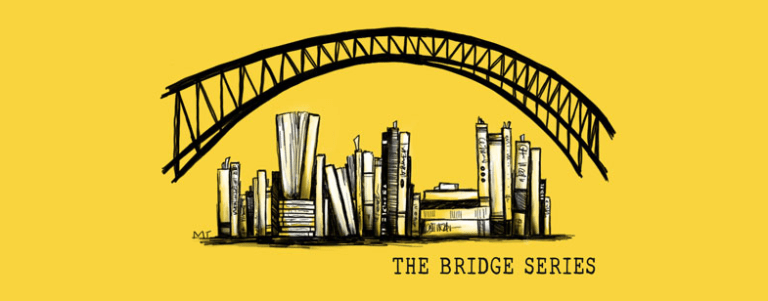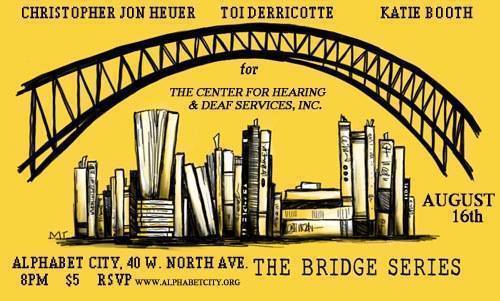The Bridge Series is a new series uniting the Pittsburgh literary and activist communities to raise awareness and funds for local organizations fighting the good fight in these troubling times. Each installment will feature Pittsburgh’s finest writers and a special guest organization, with proceeds from the evening going directly to that organization.
The August 16th installment of The Bridge Series featuring the writers Christopher Jon Heuer, Toi Derricotte and Katie Booth — and the guest organization for the evening, The Center for Hearing & Deaf Services, Inc. (HDS) — was curated by writer and Bridge advisory board member Ellen McGrath Smith.
Ellen McGrath Smith teaches at the University of Pittsburgh and in the Carlow University Madwomen in the Attic program. She holds an MFA in poetry from the University of Pittsburgh and a PhD in Literature from Duquesne University. Her full-length poetry collection, Nobody’s Jackknife, was published in fall 2015 by the West End Press.
How does writing relate to activism? How has activism influenced or affected your writing?
I have not found it possible to separate politics from my writing, ever. One of the beautiful things about writing is its holistic nature: virtually all of one’s experience filters into the work. I know that my sense of what is right and fair comes from my reading; very few media provide such full access into others’ consciousnesses, and that lays fundamental ground for empathy. Activism and writing are inseparable.
What are the goals of The Bridge Series? How does it fit into the local literary scene?
The Bridge Series commits to yoking writing with the amazing work being done in the area to promote equality, equity, and diversity of identity & experience. I like that, as the series has progressed, we come to see the work people do to improve the lives of others as art, and to see art as a means to improving the lives of others.
Why did you invite HDS to be the guest organization this month? Tell us a little about their mission.
HDS has been helpful to me in helping me to identify ways to manage my disability in my role as a teacher. Whenever I visit for a test, I see young D/deaf and hearing-impaired children engaged in group activities; I see young adults being prepared for the work world. HDS meets every individual where they are and doesn’t privilege one means of navigating hearing loss over the other. It provides assistive devices and ASL training, and makes these resources accessible to everyone, regardless of how much money one has. As a poet with hearing loss, few things are more important to me than access to the spoken word.
Is there a particular writer, book, or poem that has influenced you as a literary activist that you’d like to shine some light on?
There are so many!
Adrienne Rich has been an important voice for me since I was very young, as she utterly refused to make a distinction between her creative work and her activism—and often was criticized for that by so-called literary purists. The work of Toni Morrison, Dorothy Allison, and more recently Ocean Vuong and Jenny Johnson, bring me into a deeper sense of the intersections of race, class, gender, and sexuality. And the vibrant work of writers in the disability literature community have enlivened my sense of how our bodies frame our experiences and the way we reflect those experiences; a good sampling of such work can be found in two anthologies by Cinco Puntos Press — Beauty Is a Verb: The New Poetry of Disability and The Right Way to Be Crippled and Naked: The Fiction of Disability (this latter collection includes a compelling story by Christopher Jon Heuer, who will be reading on Aug. 16).
What advice would you give to local writers who want to have their voices heard?
Go to readings, check out Littsburgh for listings. Find or form workshops where you can share feedback. Also, seek small groups of writers who want to free-write together. The Internet can help you to expand your community, too. Remember that, despite differences in style and thematics, all writers share an openness to difference, or should share that, anyway. So don’t just gravitate to events and workshops involving “like-minded writers.”
What do you hope the audience will walk away with after this event?
I hope those in the audience who are D/deaf or hard-of-hearing will be pleased to be offered means for enjoying the reading, which just doesn’t happen often enough. For those who sign, there will be an ASL interpreter. For those who have hearing aids with FM loops, City of Asylum has a limited number of receivers for that. City of Asylum also has a system that works with the wi-fi Hearing Hotspot app. Download the free app before coming to the event; then, on site you’ll receive instructions for using it—bring headphones or earbuds.


























